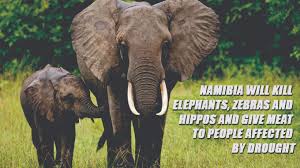Namibia’s Plan to Address Drought and Food Insecurity
Namibia plans to cull over 700 wild animals to combat food insecurity caused by its worst drought in a century. The country will distribute the meat to people in need. Namibia plans to swallow the wildlife.
Animals to Be Culled
The culling will involve 83 elephants, 30 hippos, 60 buffalo, 50 impala, 100 blue wildebeest, and 300 zebras. These animals will come from national parks and communal areas with sustainable populations. Professional hunters will carry out the culling. Namibia plans to swallow the wildlife.
Purpose of the Program

The Ministry of Environment, Forestry, and Tourism announced the program aims to relieve the effects of the drought. Namibia declared a state of emergency in May as drought conditions worsened, leaving 1.4 million people facing food insecurity.
Reducing Pressure on Water Resources
The culling will reduce pressure on limited water resources. Wildlife numbers in some areas exceed available grazing and water. By reducing these populations, the government aims to prevent further strain on water supplies.
Minimizing Human-Wildlife Conflict
The program also seeks to prevent conflicts between humans and wildlife. Elephants, in particular, are likely to venture into human settlements during drought in search of food and water. As a result, 83 elephants from conflict zones will be culled, and their meat will be distributed through drought relief efforts.
Southern Africa’s Elephant Population
Southern Africa is home to over 200,000 elephants. The region’s wildlife, including elephants, has suffered due to drought, with hundreds believed to have died last year as water sources dried up.
Meat Distribution
The meat from the culled animals will help those facing hunger, especially in rural areas. So far, over 150 animals have been killed, providing more than 125,000 pounds of meat to the affected communities.
Drought Driven by El Niño
Namibia, like other southern African countries, is grappling with drought worsened by El Niño and the climate crisis. The lack of rain and extreme temperatures have caused crops to fail, worsening the food shortage.
Namibia’s Response to Crisis
Namibia’s government emphasizes the need for immediate action. The country faces an unprecedented drought that has severely impacted both wildlife and human populations. By reducing wildlife numbers, they aim to alleviate the pressure on natural resources and provide relief to people suffering from hunger.

International Concerns and Local Solutions
While some international organizations may express concern about culling animals, Namibia defends its approach as a necessary response to an urgent crisis. The Ministry of Environment highlights that culling will be done responsibly and targets areas where wildlife numbers are sustainable. This solution aims to balance wildlife conservation with the needs of vulnerable populations.
Supporting Rural Communities
Rural areas have been particularly hard-hit by the drought. Many residents rely on farming and herding, but dry conditions have made it nearly impossible to grow crops or sustain livestock. By providing meat from the culled animals, the government hopes to offer relief to these struggling communities.
Long-Term Solutions Needed
Though culling offers a temporary solution, Namibia recognizes that long-term strategies are crucial to address recurring droughts. The government plans to work on broader environmental and agricultural reforms to improve water management and support more sustainable livelihoods in the future.
A Difficult but Necessary Step
Namibia’s decision to cull wildlife is not taken lightly. The program represents a difficult, yet practical, measure to protect both people and animals from the worsening impacts of climate change. By focusing on immediate relief while considering the future, Namibia seeks to navigate a path through this environmental and humanitarian crisis.
hunger for tens of millions of people in the region.
